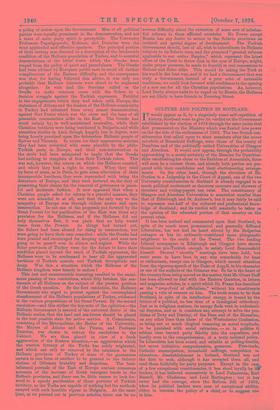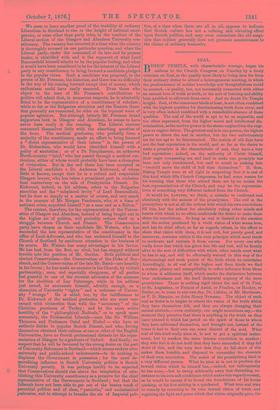CULTURE AND POLITICS IN SCOTLAND.
IT would appear as if, by a singularly exact self-repetition of history, Scotland were to give its verdict on the Government established by the election of 1874 through the same juries that first pronounced on the Ministry which was floated into power on the the tide of the enthusiasm of 1868. The two Scotch con- stituencies first called upon to elect members after the annus mirabilis of Household Suffrage, were those of the county of Dumfries and of the politically united Universities of Glasgow and Aberdeen. It would now appear, through the probability approaching to a moral certainty of the Member for Dumfries- shire establishing his claim to the Earldom of Annandale, there will soon be a contest there, and already both parties are pre- pared with their candidates and their electioneering arrange- ments. On the other hand, through the elevation of Mr. Gordon to a Judgeship in the Court of Appeal, one of the two University constituencies in Scotland is already engaged in as much political excitement as decorous caucuses and showers of circulars and voting-papers can raise. The constituency of Glasgow and Aberdeen Universities is somewhat smaller than that of Edinburgh and St. Andrew's, but it may fairly be said to represent one-half of the cultured and professional know- ledge of Scotland ; and its verdict will assuredly be taken as the opinion of the educated portion of that country on the present crisis.
It has been noticed and commented upon that Scotland, in spite of its much more pronounced and generally diffused Liberalism, has not had its heart stirred by the Bulgarian outrages as has its ordinarily-considered more phlegmatic neighbour to the south of the Tweed. The two leading Liberal newspapers in Edinburgh and Glasgow have shown themselves pro-Turkish enough to satisfy Lord Beaconsfield himself. Several " atrocity " meetings have been held, but none seem to have been in any way remarkable for heat or enthusiasm, except one in Glasgow, which caused attention from the vigorous speech of the Duke of Argyll, in his character as one of the authors of the Crimean war. So far is the heart of the country from being moved on the matter, that Mr. Grant Duff has been allowed to deal with the Eastern Question, in letters and magazine articles, in a spirit which Dr. Fraser has described as the "sang-froid of officialism," without his constituents passing a vote of censure on him. The truth seems to be that Scotland, in spite of its intellectual energy, is bound by the fetters of a political, no less than of a theological orthodoxy. Just as in religious matters, its energy finds vent in ecclesiasti- cal disputes, and as it considers any attempt to solve the pro- blems of Duty and Destiny, of the Here and of the Hereafter, on any other lines than those of the Westminster Confession, as being not so much illogical reasoning as moral turpitude, to be punished with social ostracism, — so in politics it seldom rises beyond party fidelity into the exposition, and hardly even to the comprehension, of a truly national policy. Its Liberalism has been sound, and reliable at polling-booths, but never initiative, comprehensive, generous. Free-trade, Catholic emancipation, household suffrage, compulsion in education, disestablishment in Ireland, Scotland was not the first to seek, although it has accepted them all, and used them faithfully for party purposes. Except in the cas9. of a few exceptional constituencies, it has stood loyally by itlf leaders, it has believed successively in Lord Palmerston, Earl Russell, Mr. Gladstone, and Lord Harlington; but it has never had the courage, since the Reform Bill of 1832, when its political leaders were men of exceptional ability, either to traverse the policy of a chief, or to suggest one to him.
We seem to have another proof of the inability of ordinary Liberalism in Scotland to rise to the height of national emer- gencies, or raise other than party cries, in the conduct of the Liberal section of the Glasgow and Aberdeen University con- stituency. The vacancy has occurred at a time when the country is thoroughly aroused on one particular question, and when the Liberal party, under the command of its late and its present leader, is identified with and is the exponent of what Lord Beaconsfield himself admits to be the popular feeling, and when it would have been considered to be for the interest of the Liberal party in any constituency to bring forward a candidate pledged to the popular views. Such a candidate was proposed, in the person of Mr. Freeman, the historian, and there was no difficulty in the way of his coming forward except that of money, which enthusiasm could have easily removed. Even those who object to the tone of Mr. Freeman's contributions to politics will admit that, in numerous respects, he is admirably fitted to be the representative of a constituency of scholars ; while so far as the Bulgarian atrocities and the Eastern Ques- tion generally are concerned, he rides on the topmost wave of popular agitation. But although latterly Mr. Freeman found supporters both in Glasgow and Aberdeen, he seems to have never been really in the running. The Liberal electors concerned themselves little with the absorbing question of the hour. The medical graduates, who probably form a majority of the constituency, made an effort to bring forward a "direct representative of their labour" in the person of Dr. Richardson, who would have identified himself with a policy of sanitation ; or of a Dr. Farquharson, an unknown North-country "laird," who has passed through a medical cur- riculum, either of whom would probably have been a champion of vivisection. But in the end there has been accepted as the Liberal candidate a Dr. Anderson Kirkwood, of whom little is known, except that he is a retired and respectable Glasgow lawyer, who has taken a prominent part in ecclesias- tical controversy on the side of Presbyterian Dissent. Dr. Kirkwood, indeed, in his address, refers to the Bulgarian atrocities and the "misplaced levity" of Lord Beaconsfield, but he does so simply as a matter of course, and very much in the manner of Mr. Morgan Pendennis, who, at a time of national crisis, acquitted himself "as a man and as a Briton."
The contest, therefore, for the representation of the Univer- sities of Glasgow and Aberdeen, instead of being fought out in the higher air of politics, will probably reduce itself to a struggle between Church and Dissent. The Conservative party have chosen as their candidate Mr. Watson, who has succeeded the late representative of the constituency in the office of Lord-Advocate, and who has endeared himself to the Church of Scotland by assiduous attention to the business of its courts. Mr. Watson has many advantages in his favour. He has had, from the first, no rival, but has stepped without trouble into the position of Mr. Gordon. Both political and clerical Conservatism—the Conservatism of the Duke of Buc- clench, and the Conservatism of the late Mr. Baird—are heartily in his favour ; he has made no enemies in his Church, by violent partisanship ; men, and especially clergymen, of all parties feel grateful to one of the stoutest advocates of the measure for the abolition of Lay Patronage, while in his address just issued, he announces himself, adroitly enough, as a champion of University " rights " and a redresser of Univer- sity "wrongs." He is aided, too, by the indifference to Dr. Kirkwood of the medical graduates, who are more con- cerned with vivisection than with the " autonomy " of the Christian provinces of Turkey ; and by the more active hostility of the "philosophical Radicals," or to speak more accurately, the Professorial Liberals—men like Sir William Thomson and Professors Caird and Nichol — who have an a3sthetic dislike to popular Scotch Dissent, and who, having themselves obtained their culture at one or other of the English Universities, have no Scotch professional distaste for the repre- sentation of Glasgow by a graduate of Oxford. And finally, we suspect that he will be favoured by the strong desire on the part of University Reformers in Scotland—which means seekers after university and public-school endowments—to do nothing to displease the Government in possession ; for the most de- moralising influence in Scotch University politics is Scotch University poverty. It was perhaps hardly to be expected that Conservatives should rise above the temptation of esta- blishing this University constituency as a preserve for the chief representative of the Government in Scotland ; but that the Liberals have not been able to get out of the beaten track of parochial politics and of class, "patriotic," and ecclesiastical jealousies, and to attempt to breathe the air of Imperial poll-
tics, at a time when these are all in all, appears to indicate that Scotch culture has not a refining and elevating effect upon Scotch politics, and may even resuscitate the old suspi- cion that culture generally does not promote sensitiveness to the claims of ordinary humanity.



































 Previous page
Previous page